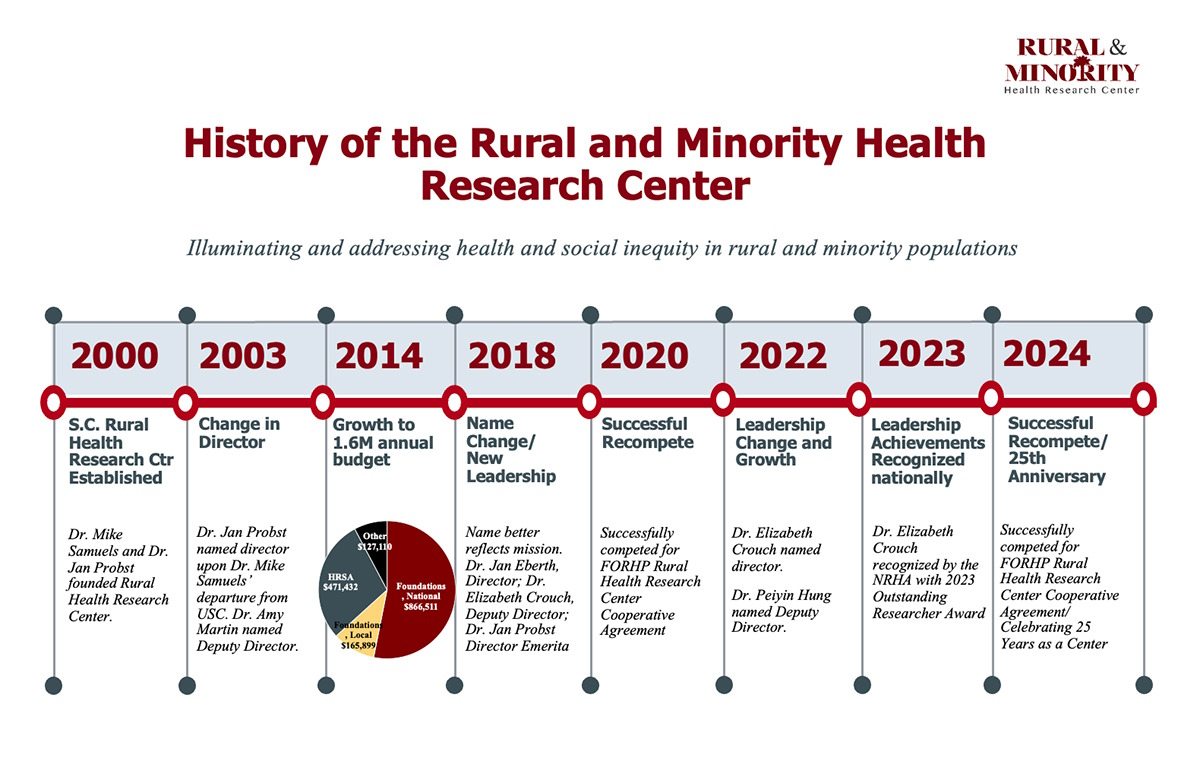
Find Out More
The Rural and Minority Health Research Center works to illuminate and address the health and social inequities experienced by rural and minoritized populations to promote the health of all through policy-relevant research and advocacy.
August 21, 2024 | Erin Bluvas, bluvase@sc.edu
Scientists at the Rural and Minority Health Research Center will celebrate their 25-year anniversary this year, with eyes set on approaching their 30th. The center has recently secured an additional $2.8 million in funding from the Health Services Resources & Services Administration’s Federal Office of Rural Health Policy – for the fifth consecutive cycle.
With steady guidance from the first three directors - Mike Samuels, Jan Probst (who led the center for the longest tenure of 15 years) and Jan Eberth, co-directors Elizabeth Crouch and Peiyin Hung are holding the reins with their eyes set on the 30th. Originally named the South Carolina Rural Research Center, the center has grown to include over thirty faculty/staff and affiliates and has continually expanded its services to respond to the existing and emerging concerns faced by rural and minority residents of the state. Since 2000, the center has completed over 80 research projects, produced 152 policy briefs, and published 277 original scientific publications and literature reviews examining issues of importance to rural health broadly and rural minority groups specifically.

“Our mission remains on incorporating social determinants of health into rural health policy research, with the aim to enhancing access, quality and outcomes for rural Americans,” says Crouch, an associate professor in the Department of Health Services Policy and Management (HSPM). “During this new funding cycle, we will advance our established health policy work on the intersection of race and place by extending to Medicaid policy and services across urban and rural communities in the United States.”
Across these leaders and fundings cycles, the center has worked to develop methods and conduct research to better understand the health status, health care needs, and health services utilization of rural and minority populations. They also examine the effectiveness and amenability of rural health policies in improving health and removing barriers to care for these groups, especially those living in low-income households.
While this work spans various areas and methods, some of their projects include identifying geographic and racial disparities in mental health outcomes among postpartum women, combatting HIV and STIs in rural communities, investigating barriers to maternal health care access due to poverty and/or structural racism, and assessing whether telehealth adequately supports rural and minority pregnant women. Throughout these studies, they collaborate with researchers, public health practitioners and policymakers across the state.
“In this new phase, we are also expanding our external advisory committee,” says Hung, a HSPM associate professor. “This expansion aims to gather diverse inputs from rural health stakeholders, including national rural health policymakers, state rural health agencies, rural health care administrators, professional associations, community organizations, and rural patient advocates to guide our research priorities, methodology design, and dissemination of research findings. This continued support fuels our mission to advance rural health equity and research.”

The Rural and Minority Health Research Center works to illuminate and address the health and social inequities experienced by rural and minoritized populations to promote the health of all through policy-relevant research and advocacy.
Research center combats spread of HIV, STIs in rural communities
Elizabeth Crouch wins national award for contributions to rural health
Low-income communities face dual barriers to maternity care access
Structural racism worsens maternal health disparities for some minority women during
pandemic
Does telehealth fail minority, rural pregnant women during the pandemic?
Facility ownership matters in the provision of suicide prevention programs, study shows
Peiyin Hung (HSPM) joins National Rural Health Association’s 2019 Rural Health Fellows Program